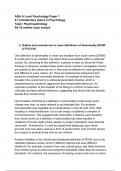AQA A Level Psychology Paper 1
4.1 Introductory topics in Psychology
Topic: Psychopathology
All 16 marker topic essays
1) Outline and evaluate two or more definitions of abnormality (DFSN
& FFA) (16)
One definition of abnormality is known as deviation from social norms (DFSN).
A social norm is an unwritten rule about what is acceptable within a particular
society. So, according to this definition, a person is seen as abnormal if their
thinking or behaviour violates these social norms of what is acceptable. Norms
are specific to the culture we live in, they may be different for each generation
and different in every culture. So, there are relatively few behaviours that
would be considered universally abnormal. An example of behaviour that
deviates from social norms is antisocial personality disorder, which is
characterised by impulsive, aggressive and irresponsible behaviour. An
important symptom of this disorder is the failing to conform to lawful and
culturally normative ethical behaviour, suggesting that those with this disorder
deviate from social norms.
One limitation of DFSN as a definition of abnormality is that social norms
change over time, an issue referred to as hindsight bias. For example,
homosexuality was regarded as a mental illness in the UK until 1973, often
resulting in institutionalisation, but is now simply considered a variation of
normal behaviour. This suggests that, historically, a reliance upon deviation
from social norms as a definition of abnormality may have resulted in
violations of human rights where people, by today’s standards, were deemed
‘abnormal’’. Furthermore, it could be argued that diagnoses upon these
grounds may have been used as a form of social control over minority groups
as a means to exclude those who do not conform.
Another limitation is the cultural and situational relativism of DFSN, due to the
variability between social norms in different cultures and even different
situations. For example, a person from one cultural group may label someone
from another group as abnormal using their standards rather than the person’s
standards. For instance, the experience of hearing voices is the norm in some
,cultures but would be seen as abnormal in most parts of the UK. Therefore,
this suggests that it’s difficult to judge DFSN across different situations and
cultures. Furthermore, this may indicate that DFSN as a definition of
abnormality has limited applicability and can only be used to define
abnormality in certain cultures or situations.
Another definition of abnormality is failure to function adequately (FFA), which
occurs when a person is unable to cope with the demands of everyday life and
cannot maintain basic standards of nutrition and hygiene. Rosenhan and
Seligman suggested some signs that someone is failing to function
adequately, such as: when a person no longer conforms to standard
interpersonal rules such as maintaining eye contact and respecting personal
space, when they experience severe personal distress and when their
behaviour becomes too irrational and dangerous. People who fail to function
adequately may also cause distress or discomfort to other people who
observe their behaviour. For example, someone who is suffering from
depression may struggle to get out of bed in the morning or they may find it
difficult to communicate with their family and friends. Consequently, they
would be considered abnormal as their depression is causing an inability to
cope with the demands of everyday life, which causes distress and discomfort
to relatives.
One limitation of the FFA definition is its failure to account for individual
differences. For example, one with obsessive compulsive disorder (OCD) may
exhibit excessive rituals that prevent them from functioning adequately, as
they constantly miss work; whereas another person may suffer from the same
excessive rituals, but still find time to complete these rituals and always attend
work on time. This suggests that, despite the same psychological and
behavioural symptoms, each person would be diagnosed differently according
to this definition. Furthermore, this highlights the issue of taking a nomothetic
approach in psychology, as it ignores the essence of being a human (such as
individual differences) and so an idiographic approach to defining abnormality
might be more appropriate.
One strength of the FFA definition is it represents a threshold for help. Most of
us have symptoms of mental disorder to some degree at one time, in fact
according to ‘Mind’, around 25% of people in the UK will experience a mental
health problem in any given year. However, many people press on in the face
of fairly severe symptoms, and it tends to be at the point that we cease to
function adequately that people seek professional help or are noticed and
, referred for help by others. This suggested that treatments and services can
be targeted to those who need them most. However, the decision about
whether someone is coping or not is subjective and based on the clinician’s
opinion, this judgement may be biased, meaning that two observers might not
agree on whether someone’s managing. This suggests that, although people
are able to receive professional help, it may not always be accurate.




